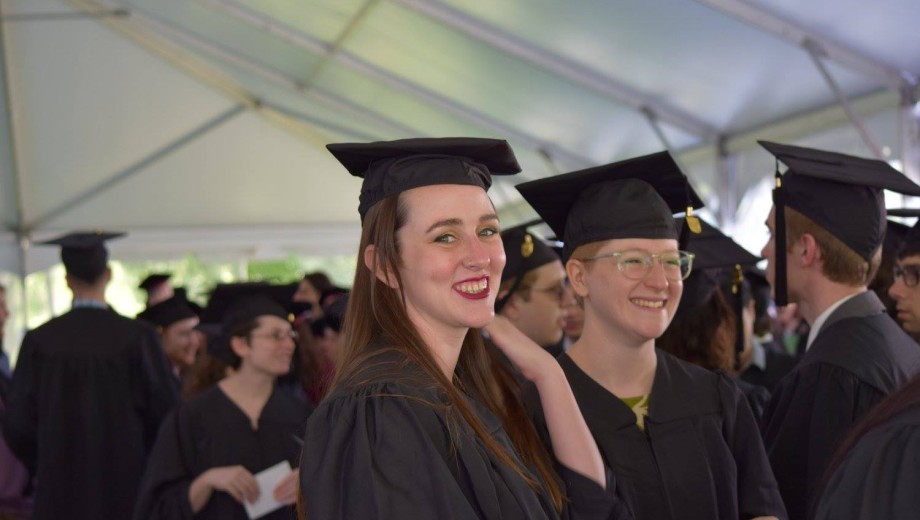When A-J Aronstein, AM’10, enrolled in the Master of Arts Program in the Humanities (MAPH), he thought he’d end up in a doctoral program for English. But his experience teaching and working as a MAPH mentor pushed him into a direction he hadn’t imagined for himself—career advising. He spent several years at UChicagoGRAD, helping graduate students in all fields find careers both inside and outside of academia. Today he works at Barnard College, where he helps to expand and strengthen the school’s career advising programs.
How did you get started in career advising?
Every year the MAPH program hires a couple of students to serve as mentors for the following year’s class. So I stuck around for an extra year. In that position, I had the freedom to look at the program and assess the advising needs of students. We had all these incredibly bright people in post-undergraduate moments of transition and reflection about what they wanted out of their commitment to the humanities and out of life. And as a mentor, I also had the opportunity to teach in the humanities Core. I really enjoyed that experience.
The second year, we built a new position dedicated to careers and career development for MAPH students, and again I got to do both teaching and advising. I was translating what I learned in the classroom into a way of developing trust with advisees and communicating with them about their possibilities. [Later that work became part of UChicagoGRAD.]
What’s an especially memorable success story?
At UChicagoGRAD, we started an event called Academic Job Market Summer Camp, a five-day intensive introduction to applying for tenure-track positions. I was a little intimidated by the prospect of trying to guide someone through that process. It requires multiple applications and multiple rounds of interviews, and there’s an enormous amount of pressure, anxiety, and heartbreak.
The very first advisee that I met with was an art history PhD student. She got an interview, and we did interview prep. She came in wearing her suit, and we went through an intensive series of questions. And then she got a campus visit. Later I get this email from her—I’m actually getting emotional just thinking about it—and she said she had gotten the job. The two people she emailed first were her dad and me.
That was a moment where I said, “OK, if I can take the most stressful thing that a student has to get through, and help them feel this way at the end of it, then sign me up.”
How does your background in the humanities help your work as a career adviser?
Humanists are trained to succeed as advisers because they are careful readers first. When you think about reading broadly, as a holistic act of interpretation, it helps you understand what the person sitting across from you at the advising table is saying about what they think they want, what they’re good at, and what they’re passionate about.
It’s not just helping students write effective cover letters. It’s helping them examine themselves, to think about using themselves as a site of evidence that can be interpreted, and then produce ideas about what they actually want to do and strategies for getting there.
What advice do you have for humanists who realize they don’t want a career in the academy?
The most important thing to do is not to run from the feeling. To paint with a too-broad brush: humanists are not a particularly rational bunch during moments of life transition. We don’t enjoy narrative twists when we’re the protagonist of the story. We fixate on what we’ve already sunk into our education and convince ourselves that we have to press onward. But it’s crucial to sit with the feeling and ask, “Do I enjoy this work anymore?” If not, then why not? What’s missing? What could be better?
I suggest that humanists think about it differently: not as leaving a path, but choosing a different one. Not as shedding an identity as a humanist, but rather thinking how to embody one’s intellectual commitments to the humanities in a different way.
What advice would you give to someone wanting to work in career advising?
Colleges and universities are thinking harder about how to do this work than ever before. The opportunities have to do with figuring out how to collaborate more intentionally with the faculty, how to weave together the intellectual project of universities and colleges into a student’s hopes and aspirations. Humanists are totally capable of doing this work.
They should also realize that it's incredibly varied. Today I have a call with Google, then I talk to American Express, and I just spoke to a local Morningside Heights nonprofit organization looking to get student volunteers. I am constantly talking to people across different industries that are shaping the city of New York, and still advising students one-on-one. If that kind of variety appeals to you, this is one field where you can have those kinds of experiences.
What have you been focused on since starting at Barnard in January?
At Barnard, we are undergoing a project imagining what the advancement of women across career fields can look like today and in the future, and what it means to provide intentional and consistent support for women of all backgrounds to be successful in the careers they choose.
That’s the heart of my job these days—making sure that Barnard students and alumnae know there are fantastic opportunities in front of them and that they feel empowered to go out and seize them.

